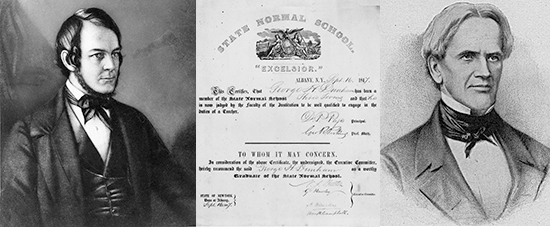Throwback Thursday: In the Beginning . . .
 |
|
Left to right, UAlbany's first leader, David Perkins Page, the oldest extant diploma of the institution, from 1847 to George H. Dunham and signed by Page, and famed educational reformer Horace Mann, who recommended Page to lead the normal school movement in New York State. (Photos courtesy of UAlbany Archives) |
ALBANY, N.Y.L (September 28, 2017) — In the way George Washington was regarded at the birth of a new nation, David Perkins Page was viewed when New York’s first public institution for training teachers came to be: The Essential Man.
A response to the popularity of the common school (now public school) movement of the 1830s and ’40s, the first New York State Normal School, to be located in the state capital, would remedy the fact that most common school teachers were poorly prepared to teach schoolchildren. Nationally known educator Horace Mann, Massachusetts’ first board of education secretary, argued passionately for professional preparation in New York.
The state legislature approved the new normal school in a May 1844 vote; the bill was signed by Governor William Bouck. Now the task was to find a principal. There were five candidates, but Mann himself expressed a favorite. A 34-year-old Newburyport (Mass.) High School teacher, David Page, had delivered several lectures on education, one of which Mann witnessed and considered among the finest he’d ever heard. (At his own expense he published 6,000 copies for the teachers of Massachusetts.)
Aided by such a recommendation, the choice of Page to lead the Normal School was assured. When classes opened on Dec. 18, 1844, for 29 students, Page and his one fellow instructor, George Perkins, divided them up and began drills in reading and arithmetic.
Page went on to shape the curriculum and educational practices that would exist at the school for decades. At the Albany Normal School, students not only learned their subjects in a depth they’d never known before, but they were taught techniques on how to teach those subjects. The difference was immediate and coveted. Page had to recruit several more teachers for the spring of 1845 to accommodate nearly 200 students.
Page was clearly the man to guide the new institution's future. In 1847, he published Theory and Practice of Teaching, and it became the most widely used textbook in all of American teacher education.
He found other ways to carry the gospel of the normal school movement beyond Albany. He painstakingly lobbied for and won yearly support for the school from stubborn politicians and common school teachers. He traveled statewide to recruit teachers, as well as to argue for permanent state funding for the school, and to give numerous lectures on the value of creating more normal schools throughout New York.
Sadly, his dedication to his cause contributed to a premature end. In late 1847, at near exhaustion from his travels, he contracted pneumonia and died at 37 on New Year’s Day of 1848.
But Page had laid rich soil for the planting of the institution's seeds. A succession of principals, beginning with Perkins, maintained the school’s leadership in the normal school movement, allowing it to evolve into an internationally praised teachers college and ultimately the University at Albany.
Only a few months after his death, New York’s legislature bestowed upon the Normal School what Page had most longed for: a permanent place in New York State’s educational system.
![]() For more news, subscribe to UAlbany's RSS headline feeds
For more news, subscribe to UAlbany's RSS headline feeds
A comprehensive public research university, the University at Albany-SUNY offers more than 120 undergraduate majors and minors and 125 master's, doctoral and graduate certificate programs. UAlbany is a leader among all New York State colleges and universities in such diverse fields as atmospheric and environmental sciences, business, education, public health,health sciences, criminal justice, emergency preparedness, engineering and applied sciences, informatics, public administration, social welfare and sociology, taught by an extensive roster of faculty experts. It also offers expanded academic and research opportunities for students through an affiliation with Albany Law School. With a curriculum enhanced by 600 study-abroad opportunities, UAlbany launches great careers.


